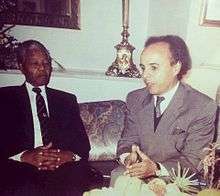Ali Oumlil
| Ali Oumlil علي أومليل | |
|---|---|
| Extraordinary Ambassador Plenipotentiary | |
|
In office 2000–2016 | |
| Monarch | Mohammed VI |
| Moroccan Ambassador to the Lebanese Republic | |
|
In office 2004–2016 | |
| Moroccan Ambassador to the Arab Republic of Egypt | |
|
In office 2000–2004 | |
| Moroccan Ambassador to the League of Arab States | |
|
In office 2000–2004 | |
| President of the Arab Organization for Human Rights | |
|
In office 1996–1998 | |
| Secretary General of the Arab Thought Forum | |
|
In office 1992–1996 | |
| President of the Organisation marocaine des droits humains (OMDH) | |
|
In office 1990–1993 | |
| Member of the Board of Trustees of the Arab Institute for Human Rights | |
|
In office 1989–1993 | |
| Co-Founder and President of the Association marocaine des droits humains | |
|
In office 1979–1985 | |
| Personal details | |
| Born | December 25, 1940 |
| Alma mater |
University of Cairo Sorbonne University |
Ali Oumlil (Arabic: علي أومليل; born December 25, 1940) is a Moroccan philosopher, thinker, human rights activist, diplomat and political persona.
Early life and education
Oumlil was born in Kenitra, Morocco, in 1940. He entered the University of Cairo in 1955 to obtain his bachelor's degree in philosophy in 1960. He then attended the Sorbonne University to work on a doctorate with French scholar and Islamologist Roger Arnaldez focusing on Ibn Khaldun methodology.[1] He completed his doctorate in 1977.
Career
Human rights

Oumlil started in 1962 as assistant professor of Contemporary Arab Thought at the Mohammed V University in Rabat, Morocco. In 1979, Oumlil co-founded the Moroccan Association for Human Rights (AMDH) in Rabat, which he chaired until 1985. Oumlil went on to co-found the Moroccan Human Rights Organization (OMDH)[2] in 1988 and served as its chairman from 1990 to 1993. He was also a co-founder and board member of the executive committee of the Arab Human Rights Institute in Tunis from 1986 to 1994. In 1997-1999, Oumlil presided the Arab Organization for Human Rights in Cairo.
Think tank
In 1992, Ali Oumlil was elected Secretary General of the Board of Trustees of the Arab Thought Forum; a leading Pan-Arab think tank presided by the former Crown Prince of Jordan Prince Hassan bin Talal, headquartered in Amman, Jordan. The center is dedicated to advancing cooperation between Arab nations and nations around the world, as well as promoting dialogue between intellectual elites and decision makers thru studies, international seminars, and workshops. The center addresses issues related to education, economy, human development and democracy. Ali Oumlil served as its Secretary General for 4 years.
Diplomacy
In 2000, Ali Oumlil was appointed Extraordinary Ambassador Plenipotentiary to the Arab Republic of Egypt[3] by His Majesty King Mohammed VI of Morocco where he served a 4-year term until 2004. During his tenure in Egypt, Oumlil held concurrently the position of the Moroccan Ambassador to the League of Arab States. Upon the end of his tenure as the Moroccan Ambassador to Egypt, Oumlil was appointed Extraordinary Ambassador Plenipotentiary to the Lebanese Republic[4] where he served from September 2004 to October 2016.
Colloqiums
Oumlil participated in numerous events, including a colloquium organized in 2002 in Cairo, Egypt, under the theme Ali Oumlil and the Arab Political Thought[5] with participants from Egypt, Syria, Lebanon, Tunisia, Jordan, and Morocco.
Writings
In Arabic
- 1979 "Al Khitab Al-Tarikh"i (Historic Arab Thought), first edition, Lebanon
- 1985 "Al-Islahyya Al-Arabyya Wal-Dawla Al-Watanyya" (Arab Reformism and Nation State), Beirut, Lebanon
- 1988 "Atturath wa-l-Tajawuz" (Cultural Legacy and Overtaking)
- 1990 "Fi Sharyat Al-Ikhtilaf" (the Notion of Divergence in the Arab Thought), Rabat, Morocco
- 1996 "Al Sulta Al Thaqafiya Wal Sulta Al-Syassiya" (Intellectual Authority and Political Power), Beirut, Lebanon
- 1998 "Al Fikr al Arabi wal Awlama wal dimoqratya" (Globalization and Democracy in the Arab Thought), Amman, Jordan
- 2005 "Suaal Al-Thakafa" (Questioning of Arabic Culture), Beirut, Lebanon
- 2013 "Afkar Muhajira" (Migrating Ideas), Beirut, Lebanon
- 2016 "Maraya Al- Dhakira" (A narrative), Casablanca, Beirut
In French
- 1982 "L’Histoire et son Discours", Rabat, Morocco
- 1990 "Islam et Etat National" (Islam and National State), Casablanca, Morocco
References
- ↑ http://philpapers.org/rec/OUMAAD
- ↑ http://www.omct.org/fr/network/maghreb-and-middle-east/morocco/m230/
- ↑ http://leconomiste.com/article/vaste-mouvement-dans-les-representations-diplomatiques
- ↑ http://www.lecourrierdelatlas.com/269021052012Maroc.-Des-socialistes-candidats-au-poste-d-ambassadeur-a-Paris.html
- ↑ http://fikrconferences.org/en/he-ali-oumlil